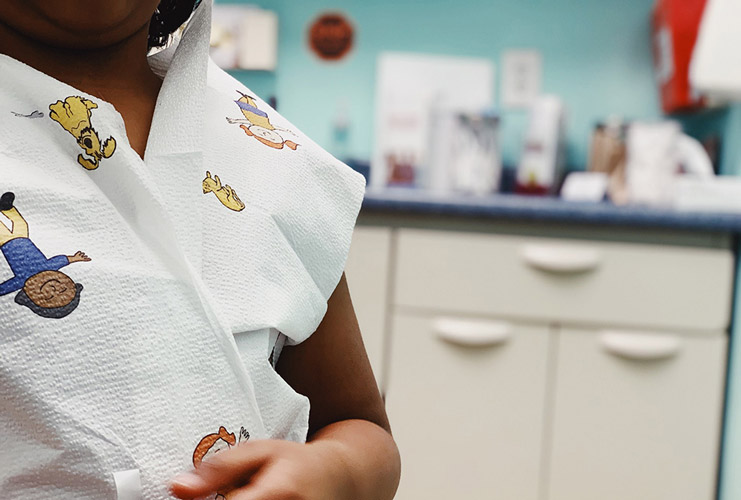Parental Guidance on Medical Neglect

Recent news has sparked outrage and concern over the concept of child medical neglect after Syesha Mercado, a former “American Idol” finalist and Broadway performer, had her newborn daughter taken away days after birth while embroiled in a previous battle with authorities to regain custody of her toddler son who was placed into the foster care system earlier this year.
The initial concern stemmed from a hospital visit in late February when Mercado and her partner, Tyron Deener, took their 1-year-old son in for dehydration after struggling to transition from breast milk to solid foods.
In a statement from the Manatee County Sheriff’s Office, the department had received information from the hospital’s child abuse line that their son was severely malnourished and that Mercado refused a B12 shot that was recommended by the hospital. The physician seen concluded that the couple was not making medical decisions in the best interest of the child; the end result was the young boy was put into the hands of child protective services (CPS) and not released to his parents at the end of his medical treatment.
According to an Instagram Live video recorded by Mercado, when deputies were asked why they were there to take her newborn, they said it was because the parents did not inform authorities that Mercado was expecting another child while still in an ongoing legal custody battle for her son. The infant had just been seen for her routine newborn visit and received a clean bill of health, but her mother was still required to hand her over to law enforcement.
Though hard to read—and even harder to fathom, these situations do happen, and both parents and providers play a role in protecting the welfare of children. It’s important to note that the universal goal of a health care professional is to reduce the risk of harm and intervene where child abuse and neglect are apparent. So, what should well-intentioned caregivers glean from this example?
Read on for a greater understanding of what’s considered medical neglect and how it’s handled in the medical world.
Making Sense of Medical Neglect
Medical neglect is defined as a parent’s failure to provide adequate and timely medical or dental care for their child’s health, especially when it is needed to treat a serious physical injury or illness. Often listed under a state’s child abuse laws, it’s considered a form of child neglect and maltreatment.
Some examples of medical neglect include:
- Failure to recognize obvious signs of physical injury, medical illness or a mental health issue.
- Delayed seeking medical assistance for an acute illness.
- Ignoring medical advice by a physician concerning a health problem.
- Bringing a child to a health care setting only when the child has become seriously ill or is in a life-threatening state.
According to the National Library of Medicine (NLM), medical neglect is most likely to occur and to be recognized when families lack resources, commonly due to poverty, and when medical demands are high, such as with complex, severe and chronic illness.
In the event that a medical professional is confronted with a case of a child’s needs being neglected, the American Academy of Pediatrics (AAP) encourages a comprehensive review of the situation while maintaining clear, two-way communication with family members. The parental competence to provide proper care for a child’s well-being involves assessing their physical and mental ability to do so, as well as their willingness to make medically appropriate decisions in a timely manner. When these factors are not present, social services are then involved. However, it’s ideal for physicians should consider the least intrusive options for managing such cases that ensure the health and safety of the victim.
What About Religious Exemptions or Alternative Medicine?
While most would agree that denying medical needs or risking the hospitalization of a child is absolutely wrong, there are circumstances where a parent’s freedom to provide whatever care they choose can blur the line of protection and become problematic.
Religious Exemptions
Religion and science are powerful drivers in human existence, and faith-based rejection of recommended medical care and procedures is prevalent in America. Though First Amendment protections for religious freedom do not include a right to neglect a child, the Pew Research Center states that in 34 states (as well as the District of Columbia, Guam and Puerto Rico), there are exemptions in the civil child abuse statutes when medical treatment for a child conflicts with the religious beliefs of parents (such as immunizations), according to data collected by the U.S. Department of Health and Human Services.
This clash between religion and medicine is an ongoing topic of debate in the US in regards to necessary medical care and the rights of parents to make decisions for their families, as children are not legally old enough to make decisions for themselves. And while child protection is absolutely imperative, it’s also worth noting that there are cases where government claims of child endangerment have been questioned for possibly being inflated, furthering the need to solidify what constitutes abuse across the board and how the rights of parents versus the rights of children play out in the world of medicine. Though often a rock and a hard place, practitioners are still required to report any and all possible lacks inched care no matter the factors involved.
Alternative Medicine
Alternative medical practices are generally not recognized by the medical community as standard medical approaches. Homeopathic and alternative practices include vitamins and supplements (often in higher doses), herbal remedies, massage therapy, prayer and spiritual healing and more. These approaches can conflict with partial or full recommended treatment plans for children, such as pediatric chemotherapy or blood transfusions.
While parents have medical authority over their children in most cases, the parens patriae doctrine (a legal term referring to the power of the government to act on behalf of people who are unable to care for themselves) gives states the right to overrule parents if it’s believed they are not acting in the best interest of the child’s well-being .
Finding a pediatrician you connect with and feel you can trust is a great first step to having an open dialogue about medical choices concerning your child. Your baby’s doctor is there to help guide you through the everyday happenings and the difficult decisions that come with parenting, and they will be able to steer you in the direction they feel best serves your child.
Lauren Lisle







